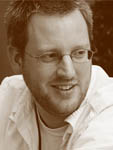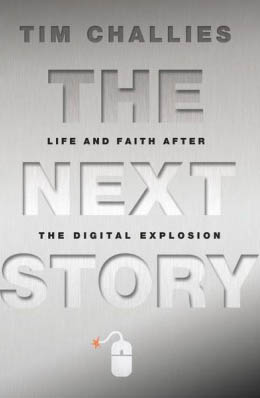About the Author
Tim Challies is a pastor at Grace Fellowship Church in Toronto, Ontario, and a co-founder of Cruciform Press. He is also a popular blogger and well acquainted with the digital age he writes about. His The Next Story: Life and Faith After the Digital Age investigates the impact digital technology has had on Christian character and living. It is a rather unique book, and we were glad he could talk with us here about it.
Books At a Glance (Fred Zaspel):
You spend quite a bit of space in the first part of your book tracing the fascinating history of communication, gadgets, and such, that has preceded and in some ways led us to life in this digital world. How is this perspective significant for the Christian? What opportunities and/or challenges do we face today that are unique or at least distinctive of our age?
Challies:
We are all prone to think that anything that pre-existed us in the world has always existed. We assume the world we are born into is the world as it has always been. My children, born in 2000 and after, all have this basic assumption that I grew up with roughly the same privileges they enjoy today—instant worldwide communication, access to all the world’s data with a simple Google search, social networks, and so on. Just the other day my children marveled when I told them that iTunes was a new invention and that I used to have to visit Christian bookstores to buy my music.
It is only when we go backwards that we remind ourselves that the world has been transformed again and again by its technologies. There is a lot we can learn by looking back to the introduction of technologies similar to our digital technologies. We find, for example, that when people began to transition from recording information in their minds to recording it in books, there was widespread fear about how this would impact humanity. We find that the introduction of the telegraph introduced many challenges that sound very similar to the challenges that have come in a Twitter world—the fast-paced nature of news and the expectation that work and home life would never quite be separate.
Christians, of all should people, need to have respect for history and be willing to look to history to learn how to live in the present and the future.
 Books At a Glance:
Books At a Glance:
You are careful to say that technology is not evil and that Christians are not wrong to use it, of course. You use it yourself, quite a bit! But you do warn that even good things can be abused. What are the leading dangers you have in mind? How can modern technology be a hindrance to relationships and Christian discipleship?
Challies:
We all use technology and are completely reliant upon it. Our functional definition of technology is “anything that was invented after I was born.” But, of course, anything that humans have ever invented is technology. Adam and Eve were created naked in a garden; anything after that has been technology, from clothes to the wheel to books to iPhones.
So yes, I am reliant on technology! I am particularly reliant on digital technologies based on much of the work I do in writing and communication. Digital technologies are no different from any other in that they can be used for such good purposes and such evil purposes. They can be used to carry out our God-given mandate—to exercise dominion over this world—or they can be used to do the very opposite. They can be used to love God and our neighbor, or they can be used to dishonor God and our neighbor.
I believe there is a very close relationship between our technologies and our idolatries. If we are delighting in God, finding our joy in him, and walking closely with him, our technologies become tools we use to further his purposes and glorify him. But if we are not delighting in God, if we are looking for joy and life elsewhere, our technologies become tools we use to pursue the flesh. Instead of using that computer to access a world of great Bible study tools, I will use that computer to access pornography. Instead of using Facebook to share truth and encourage a brother, I’ll use Facebook to gossip and to tear apart another person.
If it is out of the overflow of the heart that the mouth speaks, it is out of the same overflow of the heart that we use any technology.
Books At a Glance:
You warn about the shallow thinking that increasingly marks our age. How do you suggest this may be connected to our use of technology?
Challies:
Our digital technologies are evolving toward greater and greater distraction. They are constantly finding new ways of beeping and buzzing and flashing and otherwise taking our minds away from one thing and toward another thing. Our devices are completely thoughtless that way! They don’t care if we are asleep or awake, on the couch or at a funeral—they will try to alert us to what they think is important.
Not only that, but we are increasingly using multi-function devices. I used to read God’s Word from a printed, leather-bound Bible; but today I may be tempted to read it on my iPhone. My Bible was a single-function device that did nothing more (and nothing less) that communicate God’s Word to me; my iPhone is a multi-function device that switches back and forth between a host of functions. So as I read the Bible on my phone, I also receive phone calls and text messages and all those other notifications. This is distracting!
When we put it all together, we see that our devices are very distracting to us. If we are not people who can sit and concentrate on God’s Word, we will be shallow thinkers. If we are shallow thinkers, we will necessarily also be shallow livers—people who live shallow lives before the Lord. Distraction leads to shallow thinking which in turn leads to shallow living.
Books At a Glance:
Let’s talk about obsession. For many this technology is their business, and they depend on it for their livelihood. Our work here at Books At a Glance is all digital, as is your blog site. And others are very active online readers. For Christians on all sides of this question, what are the symptoms of ill-health here? When is a good thing a bad thing? An addiction? An idol?
Challies:
I suppose that all depends. If you see a family sitting around the living room, each of them immersed in their own book, you would think they are an intelligent and well-read family. Yet if they are all sitting around the living room, each of them immersed in their iPod or iPad, you would act shocked, as if they are all wasting their time. However, they may be doing the very same thing on those devices, or even something better. Or maybe their books were all dime store novels while their devices were accessing something far more significant. A while back I scolded my son for using his iPod during time he had marked for devotions, but he replied that he was using his iPod to listen to the Bible. I had assumed too much.
I think we should be less concerned with the volume of time we use these devices and more concerned with what we are actually doing with them. A question I always want to ask my family is this: Do we own our devices, or do they own us? Technology has become an idol when it begins to control us. These things, too, fall under our mandate to exercise dominion.
Books At a Glance:
How can the average Christian use technology to serve Christian values? What should “Life and Faith after the Digital Explosion” look like?
Challies:
Reading through the Bible we can find all manner of commands from the Lord on how we are to live and those things to which we are to give out attention. Perhaps we can highlight just a few of them here:
The Creation Mandate. We are to be fruitful and multiply and to exercise dominion over all God has created. We absolutely need to use technology in order to do this. Adam and Eve could not have done this without some inventions, without some technology. So our technology should not hinder this work. Instead, it ought to serve it.
Love One Another. The New Testament is full of commands about how we are to love one another. We are to show love to all people and special love to other Christians. Our technology can both help and hinder this kind of love. Concentrate on using technology to love other people.
The Great Commission. Christ’s final command to his people was to go into all the world and to make and train disciples. Once more, we can do this through technology or we can hinder this through technology. Focus your use of technology on means of achieving this commission and guard yourself from technologies that will significantly hinder you here.
When we know our mission, when we are sure of what we are here for, we can then analyze what technologies we use, and how we use them, and determine whether they are helping or hindering.

